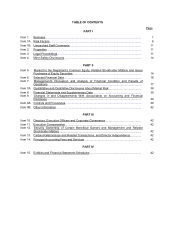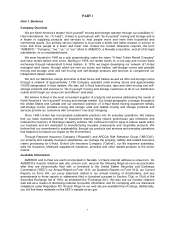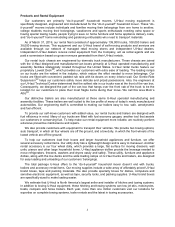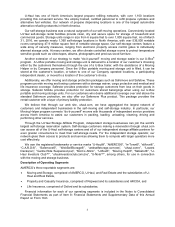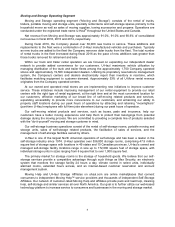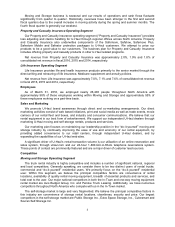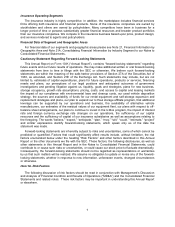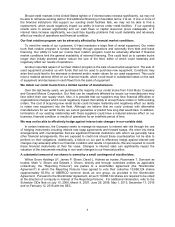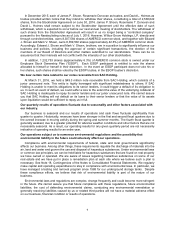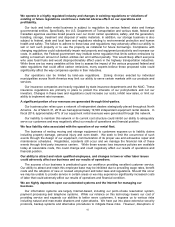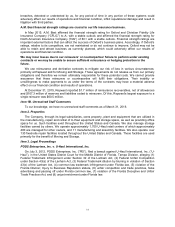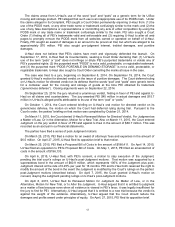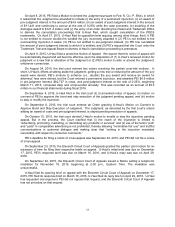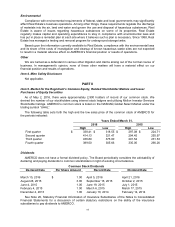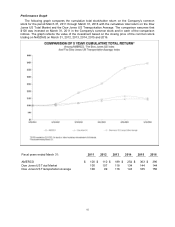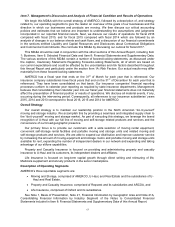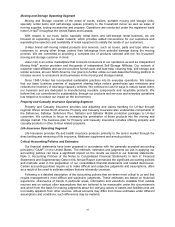U-Haul 2016 Annual Report Download - page 16
Download and view the complete annual report
Please find page 16 of the 2016 U-Haul annual report below. You can navigate through the pages in the report by either clicking on the pages listed below, or by using the keyword search tool below to find specific information within the annual report.10
We operate in a highly regulated industry and changes in existing regulations or violations of
existing or future regulations could have a material adverse effect on our operations and
profitability.
Our truck and trailer rental business is subject to regulation by various federal, state and foreign
governmental entities. Specifically, the U.S. Department of Transportation and various state, federal and
Canadian agencies exercise broad powers over our motor carrier operations, safety, and the generation,
handling, storage, treatment and disposal of waste materials. In addition, our storage business is also
subject to federal, state and local laws and regulations relating to environmental protection and human
health and safety. The failure to adhere to these laws and regulations may adversely affect our ability to
sell or rent such property or to use the property as collateral for future borrowings. Compliance with
changing regulations could substantially impair real property and equipment productivity and increase our
costs. In addition, the Federal government may institute some regulation that limits carbon emissions by
setting a maximum amount of carbon entities can emit without penalty. This would likely affect everyone
who uses fossil fuels and would disproportionately affect users in the highway transportation industries.
While there are too many variables at this time to assess the impact of the various proposed federal and
state regulations that could affect carbon emissions, many experts believe these proposed rules could
significantly affect the way companies operate in their industries.
Our operations can be limited by land-use regulations. Zoning choices enacted by individual
municipalities across North America may limit our ability to serve certain markets with our products and
services.
Our insurance companies are heavily regulated by state insurance departments and the NAIC. These
insurance regulations are primarily in place to protect the interests of our policyholders and not our
investors. Changes in these laws and regulations could increase our costs, inhibit new sales, or limit our
ability to implement rate increases.
A significant portion of our revenues are generated through third-parties.
Our business plan relies upon a network of independent dealers strategically placed throughout North
America. As of March 31, 2016 we had approximately 19,500 independent equipment rental dealers. In
fiscal 2016, approximately 47% of our equipment rental revenues were generated through this network.
Our inability to maintain this network or its current cost structure could inhibit our ability to adequately
serve our customers and may negatively affect our results of operations and financial position.
We face liability risks associated with the operation of our rental fleet.
The business of renting moving and storage equipment to customers exposes us to liability claims
including property damage, personal injury and even death. We seek to limit the occurrence of such
events through the design of our equipment, communication of its proper use and exhaustive repair and
maintenance schedules. Regardless, accidents still occur and we manage the financial risk of these
events through third party insurance carriers. While these excess loss insurance policies are available
today at reasonable costs, this could change and could negatively affect our results of operations and
financial position.
Our ability to attract and retain qualified employees, and changes in laws or other labor issues
could adversely affect our business and our results of operations.
The success of our business is predicated upon our workforce providing excellent customer service.
Our ability to attract and retain this employee base may be inhibited due to prevailing wage rates, benefit
costs and the adoption of new or revised employment and labor laws and regulations. Should this occur
we may be unable to provide service in certain areas or we may experience significantly increased costs
of labor that could adversely affect our results of operations and financial condition.
We are highly dependent upon our automated systems and the Internet for managing our
business.
Our information systems are largely Internet-based, including our point-of-sale reservation system,
payment processing and telephone systems. While our reliance on this technology lowers our cost of
providing service and expands our abilities to better serve customers, it exposes us to various risks
including natural and man-made disasters and cyber-attacks. We have put into place extensive security
protocols, backup systems and alternative procedures to mitigate these risks. However, disruptions or


